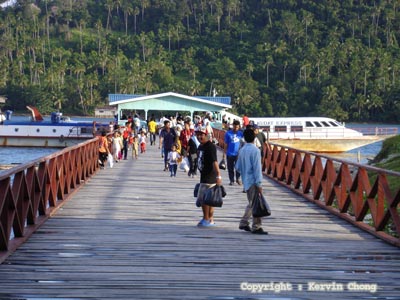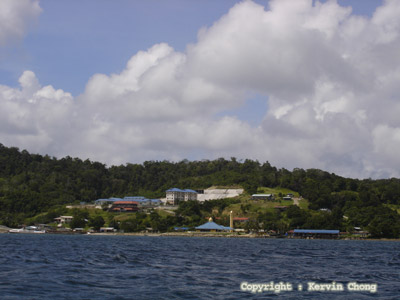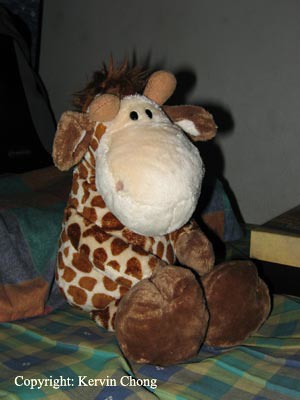Jan 5: Island bound
The Kampung Karakit ferry terminal, the entrance point to Pulau Banggi's most developed village.
The only ferry that heads out to Banggi makes two trips daily, 9.30a.m. and 4.30p.m. Before its commission the only way to get there was by a modified passenger boat that happens to be a refurbished fishing vessel of which the locals still utilize since it costs only RM5 yet takes longer. The Kudat Express is a similar make to the ferries that ply the Kota Kinabalu to Labuan trips, elongated vessels with jet propulsion not rotors. We had our breakfast at a local food stall and went ahead to get a few errands done especially the ordering of supplies for the projects. For RM18, you get a first class seats meaning more leg space, plusher seats and a free movie (we had something staring Chou Yung Fatt) to boot as you make your way on your one hour long journey.
From what I hear people say about the place it seems harsh yet as we plough through the waterway, the scenery was great, clear blue oceans, undulating hills and coconut palms strewn across the island, corals reefs shimmering pale blue under the water and bright sun shine. Our first sight once reaching and docking at the local jetty at Kampung Kerakit (the main town center and local administrative center for the various cluster of islands and their hodge podge villages along the coast) was two fast speed boats equipped with twin outboard motor with attached automatic weapons on it’s hull and manned by masked men in army fatigue. It was no surprise if you realise the fact that Banggi and its sister islands are just a hair’s breath away from the Philippine’s border, 2 hours away to be exact and thus justifying the extra security risk. All in all there are at least 3 military bases on the various islands, consisting of the navy, army and the Special Forces all looking out along the whole border. Yet the most concern is not kidnapping but more of illegal entry of PTI (pendatang tanpa izin or illegal foreigners), fishing vessel encroachment and most frequent of all, smuggling of alcohol, cigarettes and fish bombs.
Banggi is a small town, more precisely the main town, Kampung Karakit has no paved roads beside the cement ones and gravel laid roads, water supply is through rain water collection and storage, electricity is only available for 12 hours of the day (6p.m. to 6a.m.) via generator, no banks, telephone coverage is non existent (the UMS seaweed project depends on a satellite link up for its uses), television channel is limited to TV1 and TV2 and everyone knows everyone by their first name. Maybe that’s why so many people have been cautioning me about the place, to many its too primitive a lifestyle to adjust to and even for me at times it can take some getting used to. I’ve been told to bring lots of insect repellent and to take precautions such as a mosquito net to avoid contracting such disease as malaria and dengue, maybe because a junior of mine got malaria after she conducted sampling work here and the recent scare of a friend that passed away recently from it. Yet many who came here are back safely and without much ado.
The UMS seaweed project headquarters consist of two wooden kampong houses for male and female staffs as well as a couple of store houses for storage of essential items such as fuel and fish cage building materials. Since there are no large scale suppliers on the island, most of everything from food, fuel and building supply has to be ordered from the mainland and transported by ferry to the island. The setup is basic, beds for rest, a kitchen, toilets, a television and several computers for typing work and record keeping, Spartan to say the best. I soon realise why people would rather sit outside in the sun and fish or lunge at the coffee shop and talk away or even do some work out in the open as without electricity the inside of the houses can be sweltering while outside the constant breeze is a welcomed friend.
Mr Ramlan had bought some planks and boards and he intended to construct a ping pong table for recreation purpose as well as to vie away the idle time. He got about it and even though it was raining a fair bit through the evening, he managed to get some progress. We found to our consternation that the roof was leaking and had to deploy several Styrofoam boxes to collect the runoff to prevent internal flooding. The nights were cool with the rain and bathing the frigid rain water was freezing the bone. At around 5.40p.m. the lights and fans suddenly sputtered to life and I realize we had power!
We had lunch and dinner near some of the small eateries around the town. “Ada nasi goring atau tidak?” (Do you have fried rice or not?) Mr Ramlan asked.
“Sudah habis,” (We’re out) said the proprietor.
“Macam tu apa ada? Bagi kopi ais sambil tunggu,” (So what else is available? While we’re waiting please bring some iced coffee) Mr Ramlan went on.
So in the end we had fried mee (eggs were out of stock too and awaiting delivery from Kudat). Dinner was about the same with fried rice with squid and we had to sit out a storm which suddenly came about and trapped us there. A row of shops were built at the water’s edge and two were open when we arrived. The locals were busy singing away at the karaoke machine playing Indonesian and local songs while some of the others were concentrating on a game of Scrabble. The night we spent the time watching “Tai Chi master” on tv. With nothing else to do here I read ‘Blowfly’ by Patricia Cornwall and finished the whole thing, dang this was supposed to last me 5 days, should’ve brought more to read! Lucky I had the insight to download 20 plus episodes of Ranma Half to my laptop before I set off. Round midnight I slept.
Kampung Karakit

View of Kampung Karakit from the sea.





No comments:
Post a Comment